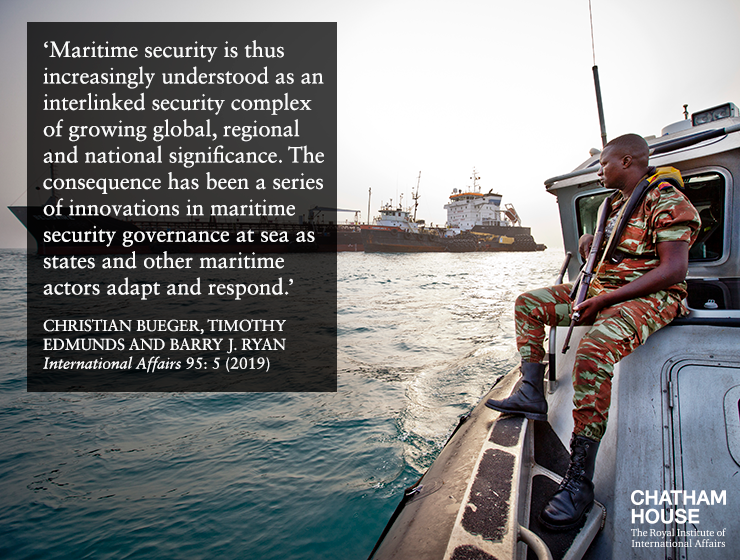Safeseas are pleased to announce that co-directors Christian Bueger and Timothy Edmunds, alongside Barry J. Ryan, have edited a special volume of International Affairs centred around maritime security.

The special issues builds upon on their previous article ‘Beyond seablindness: a new agenda for maritime security studies’ that argued that developments in the maritime arena have flown beneath the radar of much mainstream international relations and security studies scholarship, and that a new agenda for maritime security studies was required. In the introduction of the special issue, ‘Maritime security: the uncharted politics of the global sea’, they reiterate their call for more scholarly attention to be paid to the maritime environment in international relations and security studies. They further argue that the contemporary maritime security agenda should be understood as an interlinked set of challenges of growing global, regional and national significance, and comprising issues of national, environmental, economic and human security. The five contributions in the special issue set out to advance this understanding, with two having a more traditional perspective, while three analyse non-traditional areas.
In the first article, ‘Regional maritime security in the eastern Mediterranean: expectations and reality’, Aviad Rubin and Ehud Eiran analyse the limited regional cooperation of political entities along the shores of the eastern Mediterranean regarding recent developments in the eastern Mediterranean, such as significant gas finds; disagreements over the demarcation of maritime boundaries; large-scale violence and political instability following the Arab Spring; mass migration via sea routes; Great Power dynamics in the region; and environmental hazards.
Douglas Gilfoyle analyses the rule of law in maritime security, questioning whether it matters. In ‘The rule of law and maritime security: understanding lawfare in the South China Sea’. Arguing that international law provides tools for argument for or against the validity of certain practices, he argues that it is both a useful tool for consolidating gains or defeating a rival’s claims, and that China has made law a key domain in which it is seeking to consolidate control over the South China Sea.
In the third article, Elizabeth R. DeSombre turns to non-traditional areas of maritime security through her analysis of ‘The security implications of fisheries’. In it, she argues that fisheries issues can be re-centred as both a cause and effect of security conflicts due to an underlying concern of a depletion of global fish stocks. These issues are explored with four sets of security crises: conflicts over sovereignty of small maritime islands, the rise of Somali maritime piracy, the ‘fish wars’ between otherwise friendly states, and the human insecurity represented by slavery-like conditions aboard some fishing vessels.
Katja Lindskov Jacobsen and Jessica Larsen analyse the way in which studying ‘the maritime’ can offer conceptual insights to the constitutive effects of counter-piracy interventions that may prove relevant to broader debates about governance and security in a changing world order. In their article, ‘Piracy studies coming of age: a window on the making of maritime intervention actors’ they examine three specific themes: regulation (law), structures (institutions) and practices (actors), each of which highlights a distinct sense of contingency, which both characterizes contemporary security governance at sea.
Finally, Barry J. Ryan details the evolution of maritime security from the perspective of its impact on the historical architecture of sea space in his article, ‘The disciplined sea: a history of maritime security and zonation’. It argues that, as the fundamental unit of governance, zoning provides keen insight into the mechanics of maritime security, drawing upon the way in which Britain’s Hovering Acts in the late eighteenth century have shaped the rationale for underlying contemporary maritime security, resulting in a persistence of historical military logics in new formations of security-oriented practices of maritime governance.
We hope this special issue will be of great interest to everyone interested in maritime security.
